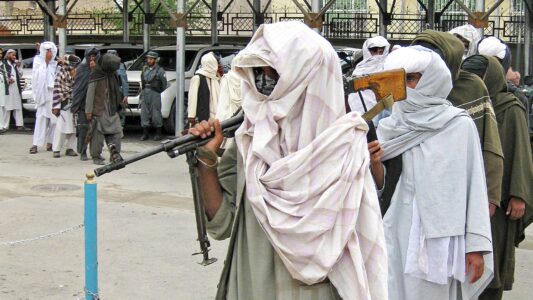
Taliban terrorists executed at least 900 people in six weeks
The Taliban executed some 900 people in six weeks in just one province as its fighters overran government troops, a police chief has claimed.
Targets included police officers, tribal elders, civil activists, and even a popular comedian who were dragged from their homes and killed in southern Kandahar province, the region’s former head of police Tadin Khan said.
Islamist fighters have now recaptured much of the province and have laid siege to the regional capital – also named Kandahar – as they push to retake control of the country following US troop withdrawal.
‘The people have suffered enormously,’ he said. ‘The brutality that occurred in Boldak is unforgivable.’
Among them was comedian Nazar Mohammad, who previously served in the Afghan police, who had his throat slit before images of his body were posted online.
Other targets of the Islamists have been Afghan soldiers in hiding – some of whom may have surrendered to the Taliban rather than fight on the promise they would be allowed to return safely home.
Religious scholars, government employees, and anyone thought to be a supporter of the government has also been targeted, Khan said.
Taliban leaders have been keen to present the modern group as moderate version of the one that the US went to war with in 2001, in an attempt to build alliances with neighbours and prevent the kind of intervention that saw it toppled from power.
But those on the ground say it is the same brutal regime as before that has imposed its strict interpretation of Sharia law on the provinces it has captured.
Aside from the executions, women say they have been banned from leaving the house without a permit and from attending school in Taliban-controlled areas.
The Taliban has denied claims of executions.
Kandahar is just one of three provincial capitals to come under attack from the Taliban, which has spent months recapturing rural areas behind the backs of retreating American and NATO troops.
Having conquered the countryside, the militants are now focusing on recapturing cities whose control is key to control of the country.
The hardest-hit has been Lashkar Gah, capital of Helmand province which is the Taliban’s traditional heartland.
Most of the city has now fallen to the Islamists, with US warplanes striking Taliban positions in an attempt to hold back the assault and buy government troops who are still holding out in a handful of areas some breathing space.
But locals report the strikes having little impact – forcing the Taliban to pause briefly while they are carried out, before resuming their attack once the bombing stops.
Government forces are meeting with greater success in the northern city of Herat, however, having pushed a Taliban assault away from its outer suburbs.
President Ashraf Ghani is hoping that by concentrating his forces in cities and holding them, the Taliban can be sufficiently weakened that it feels the need to return to peace talks which are currently at loggerheads.
The most optimistic outcome is that the government and Taliban can work out some kind of power-sharing arrangement which keeps Ghani in office.
However, if the Taliban emerge victorious then it will likely push on to try and retake the capital of Kabul – handing it back control of Afghanistan and making a mockery of two decades of western intervention.
The nightmare scenario is that no side can deal a killer blow and the conflict drags out into a prolonged and bloody civil war of the kind seen in the 1990s which spawned the Taliban in the first place.
That risks creating a severe refugee crisis and providing a safe haven for other terror groups – such as ISIS – to move into.
Just yesterday, the head of Britain’s armed forces General Sir Nick Carter warned that the country is at risk of becoming a failed state even if the Taliban re-take power.
Gen Carter also warned BBC Radio 4’s Today there is a ‘real risk’ that ‘we’re giving far too much legitimacy to the Taliban movement’.
‘There is a huge disparity between what Mullah Baradar is saying publicly, and what he’s doing publicly in travelling around countries like Russia and China, and so on and so forth, and a disparity between what’s actually happening on the ground.
‘And the international community has got to do much more about calling out the way that the people on the ground are trashing government buildings, they are threatening the population, there are reports of people being forced into marriages.’
He said there have been ‘grisly videos of war crimes’ and ‘we mustn’t let them get away with this – we’ve got to call them out’.
Source: Daily Mail





